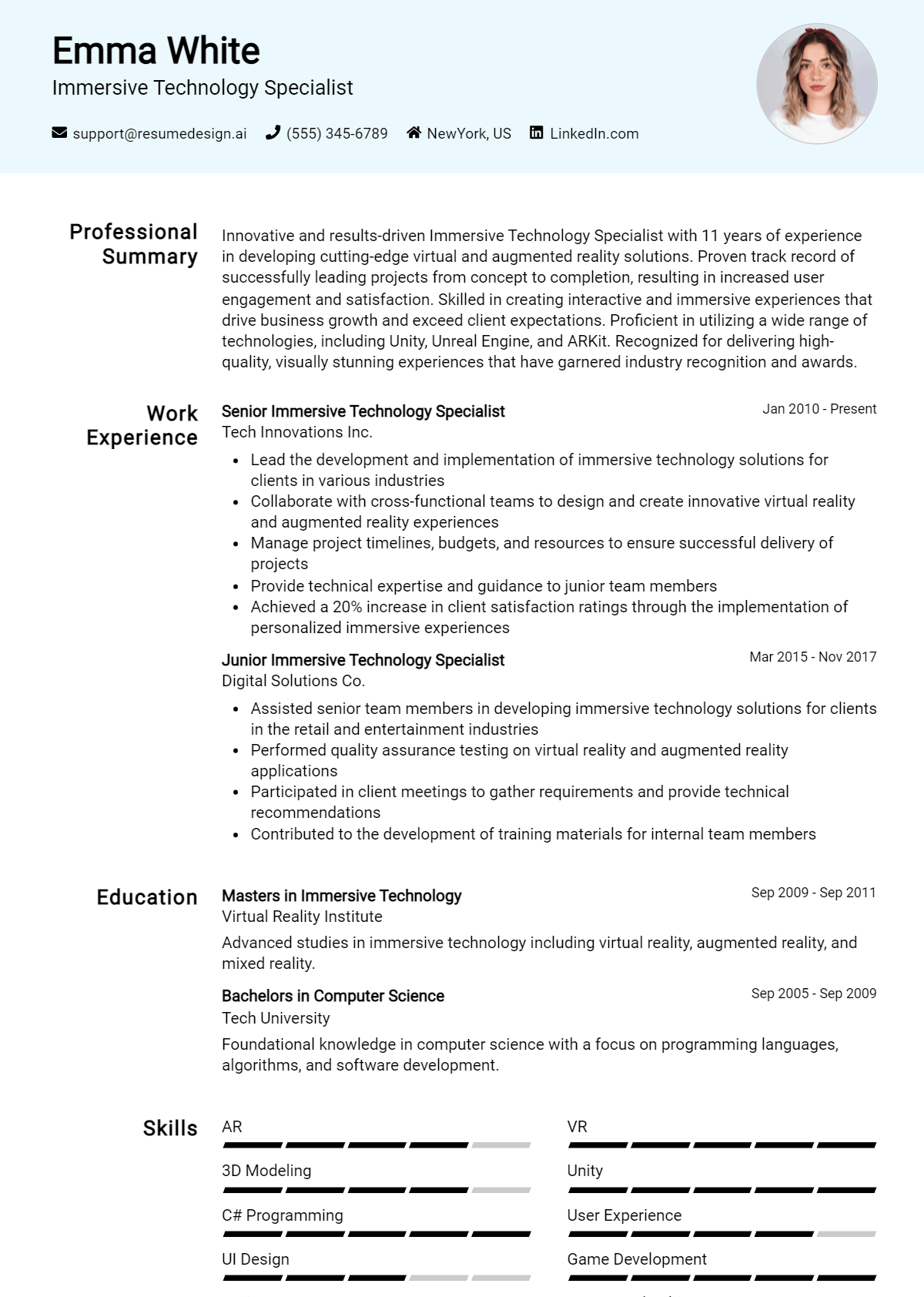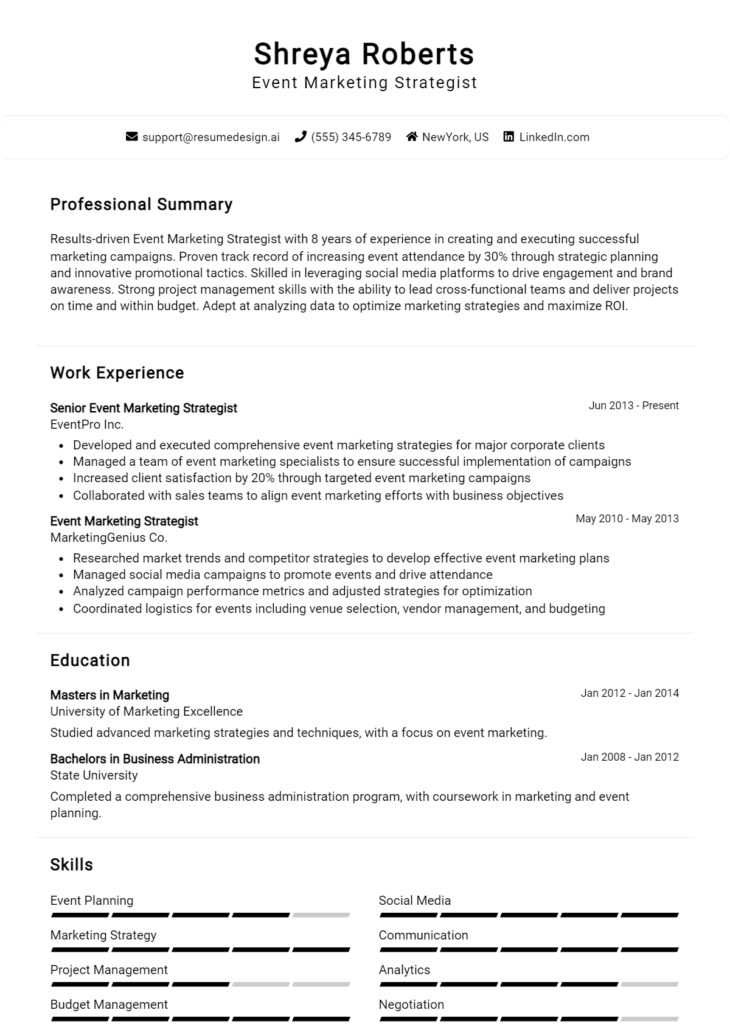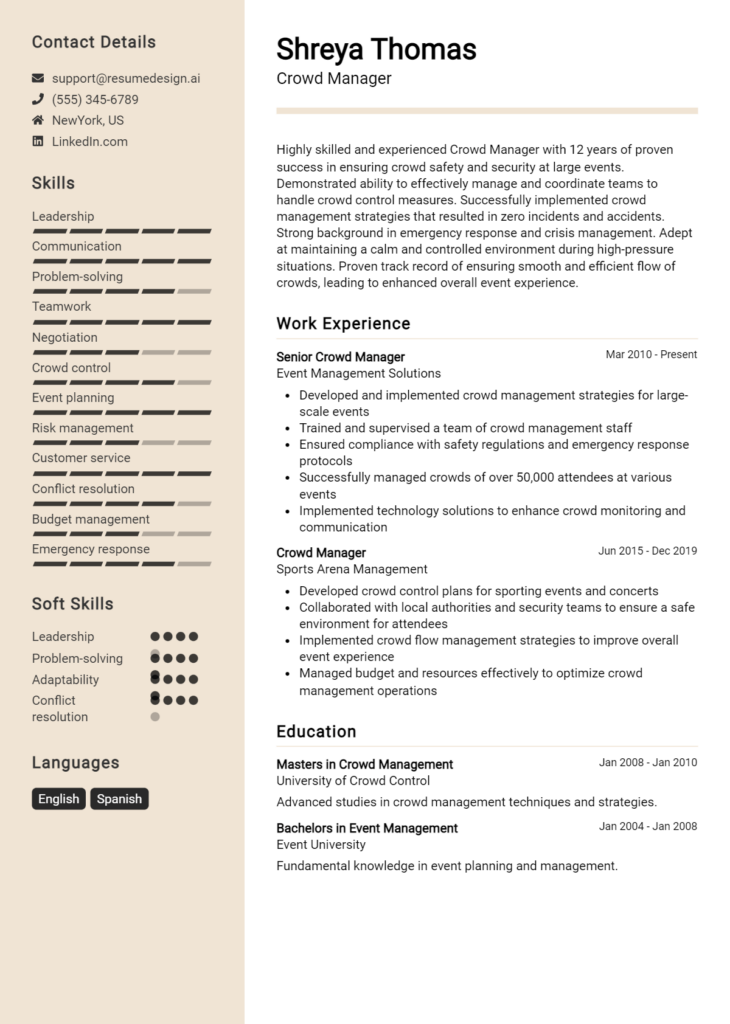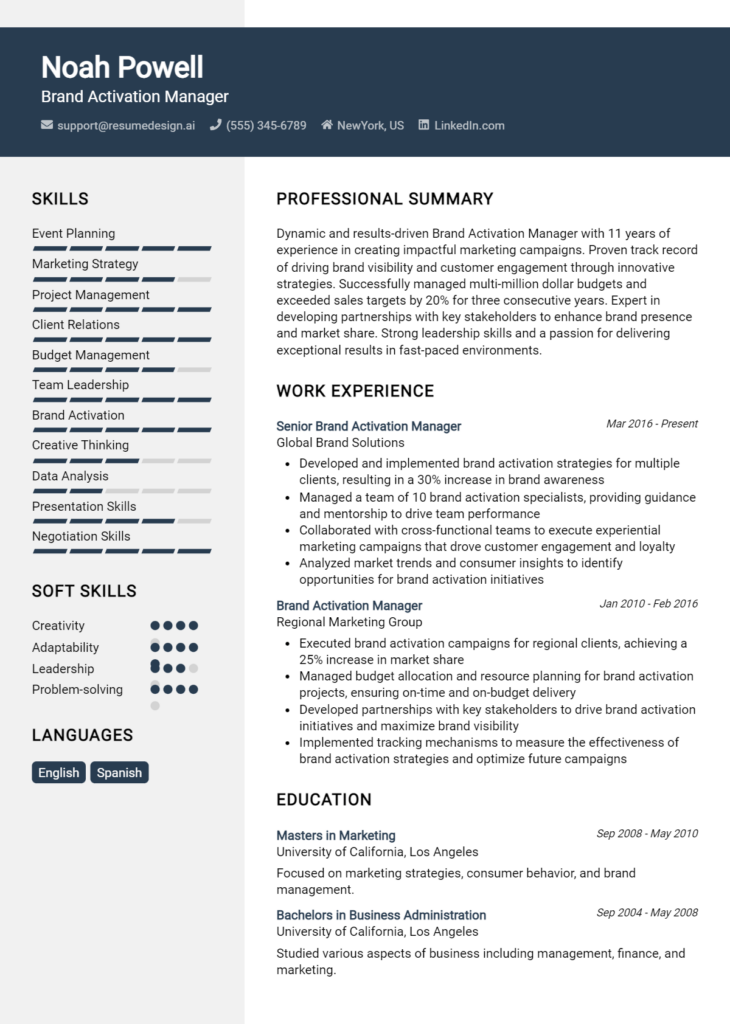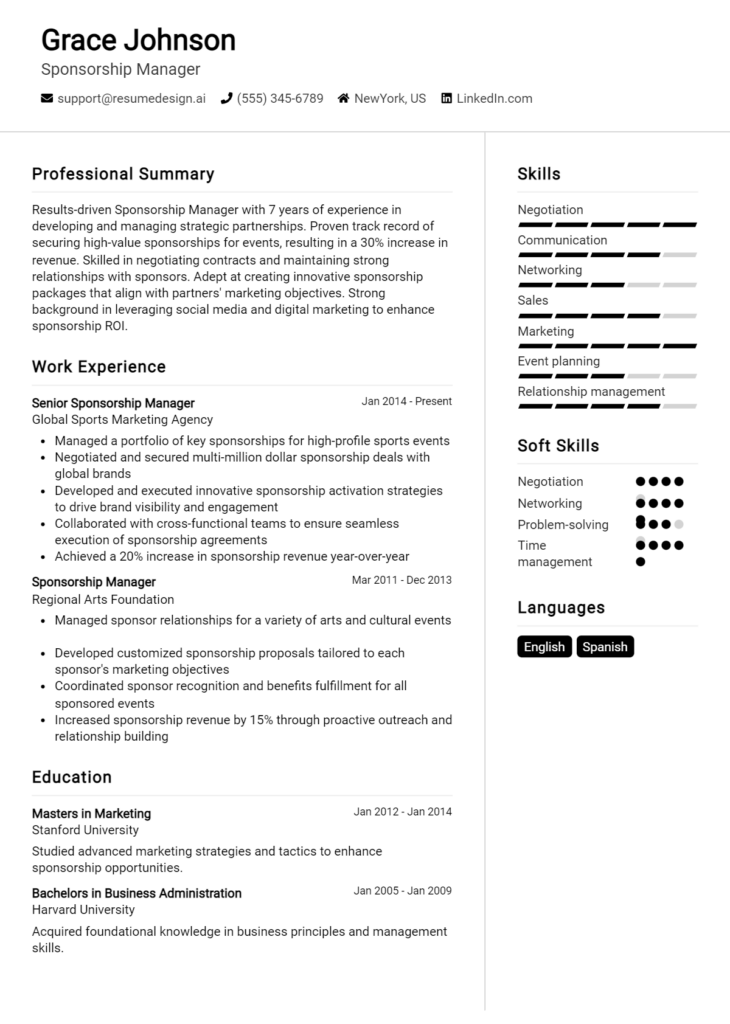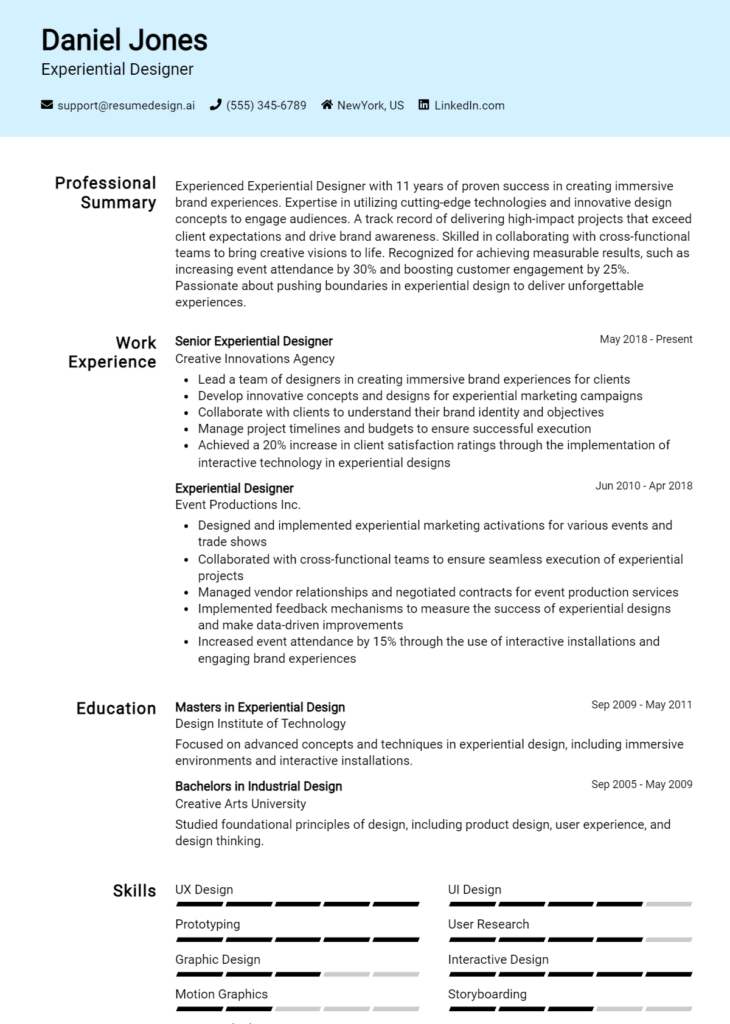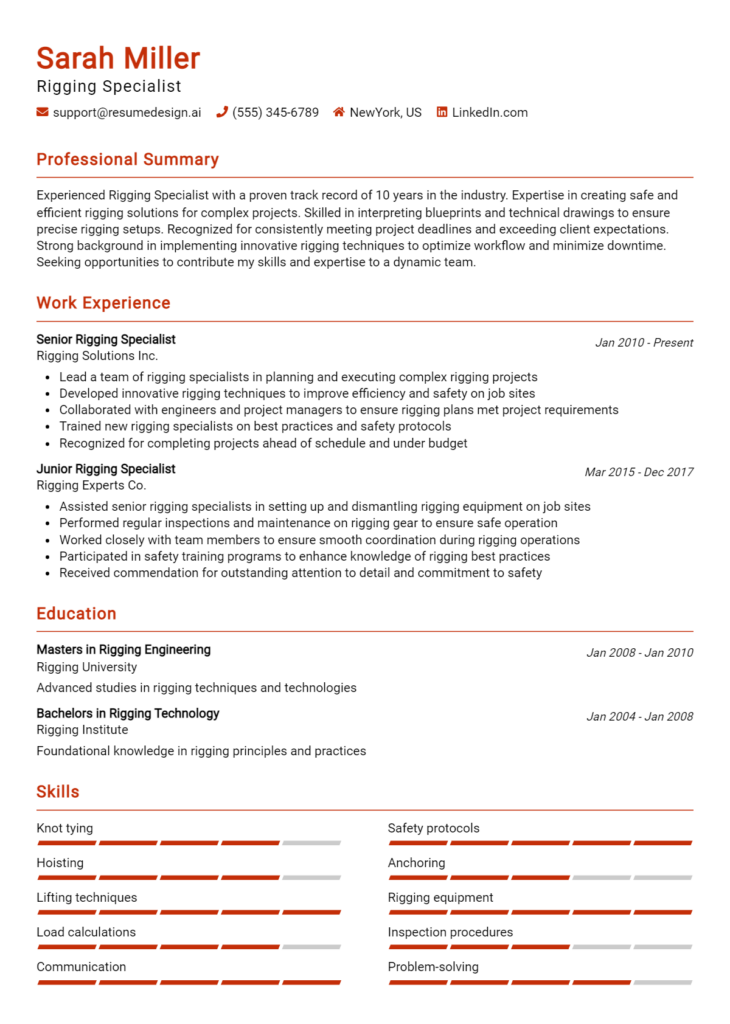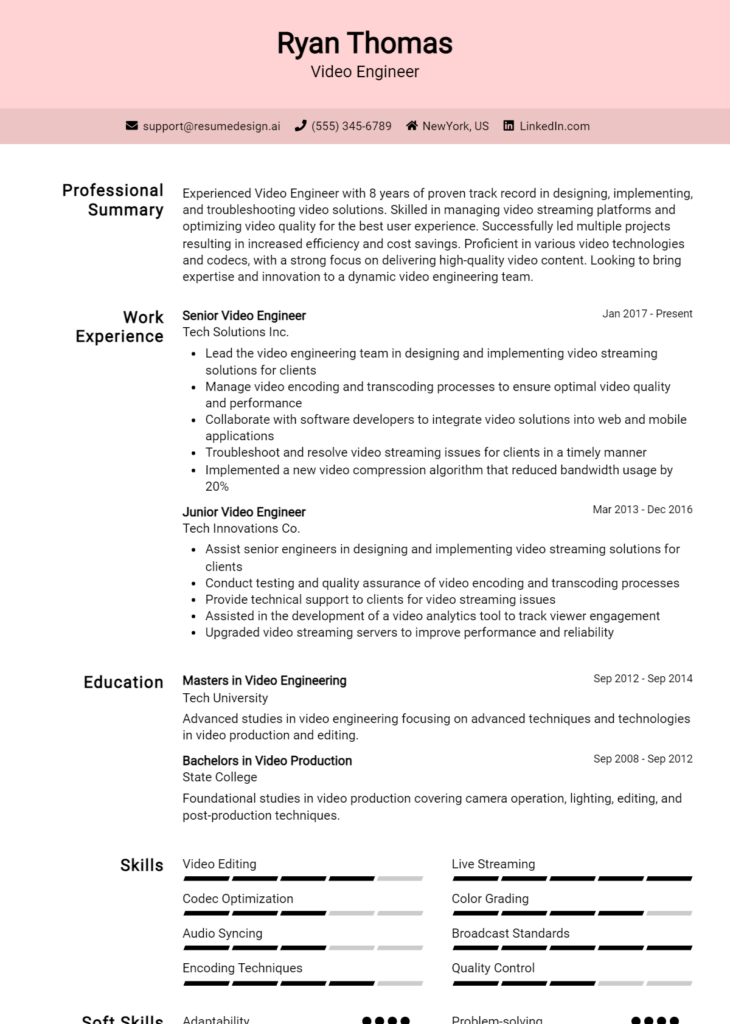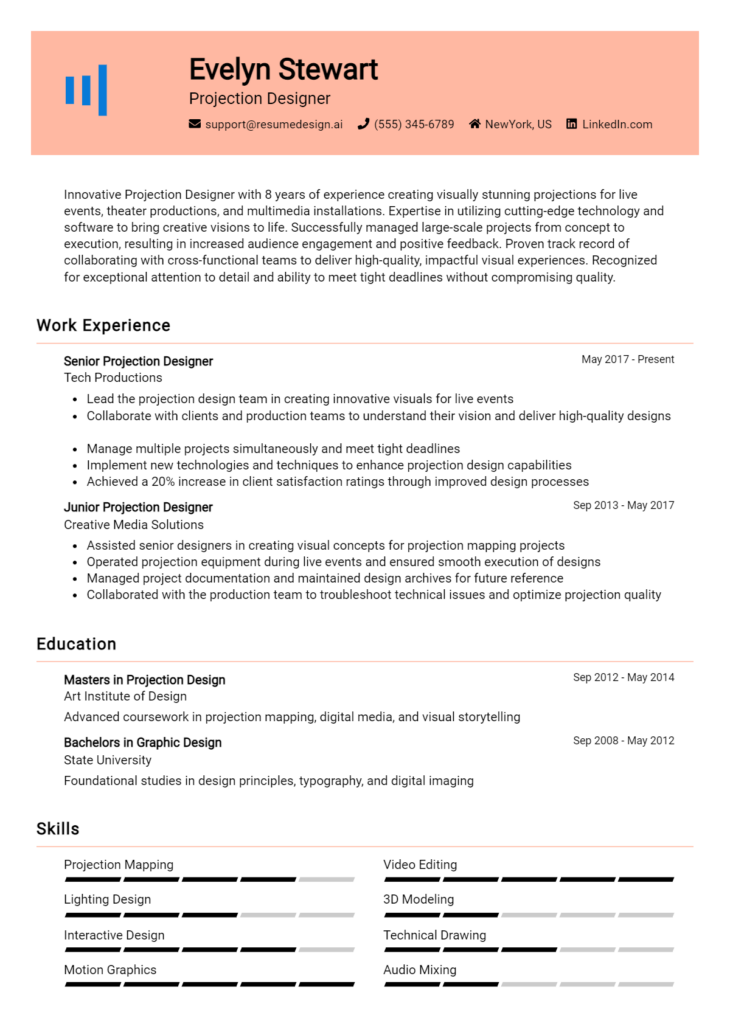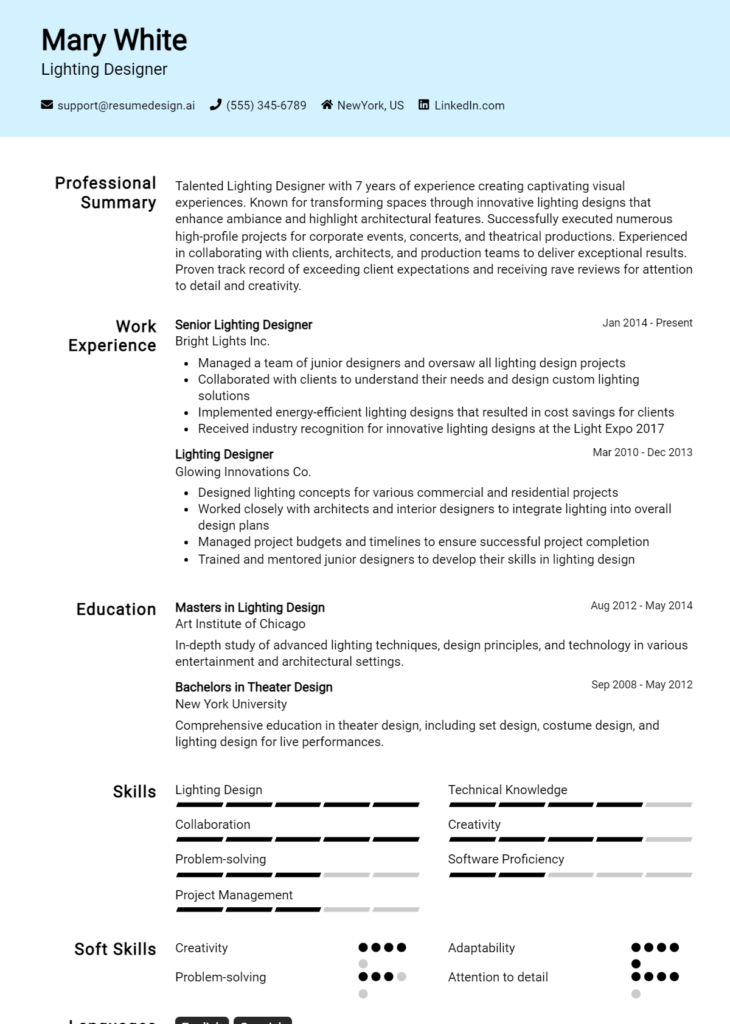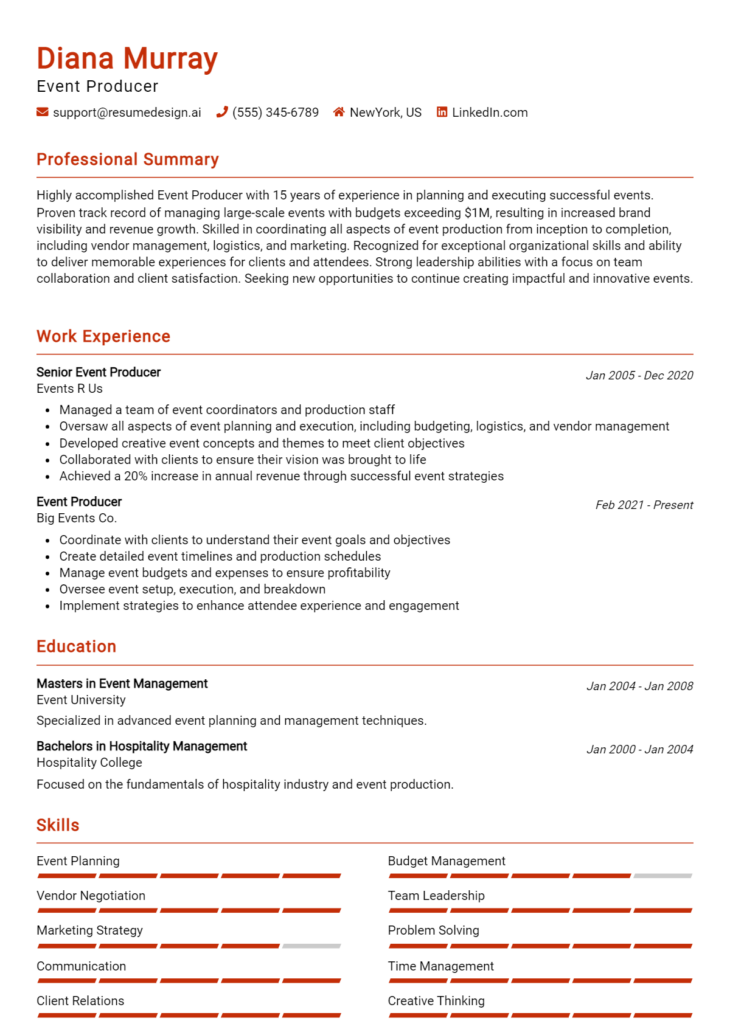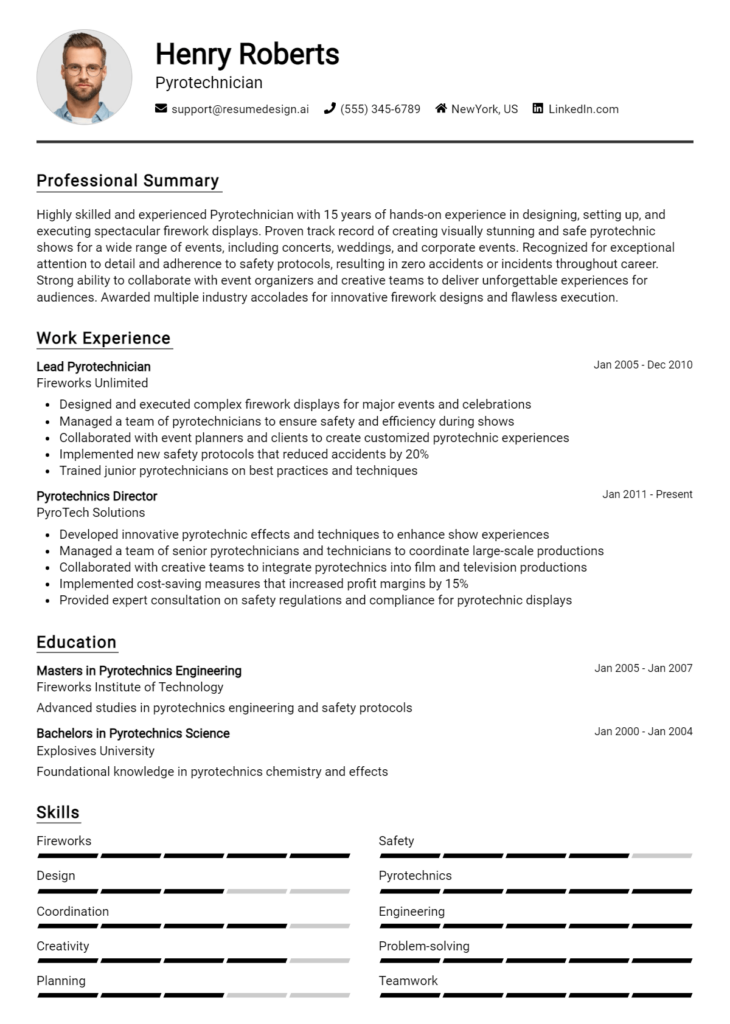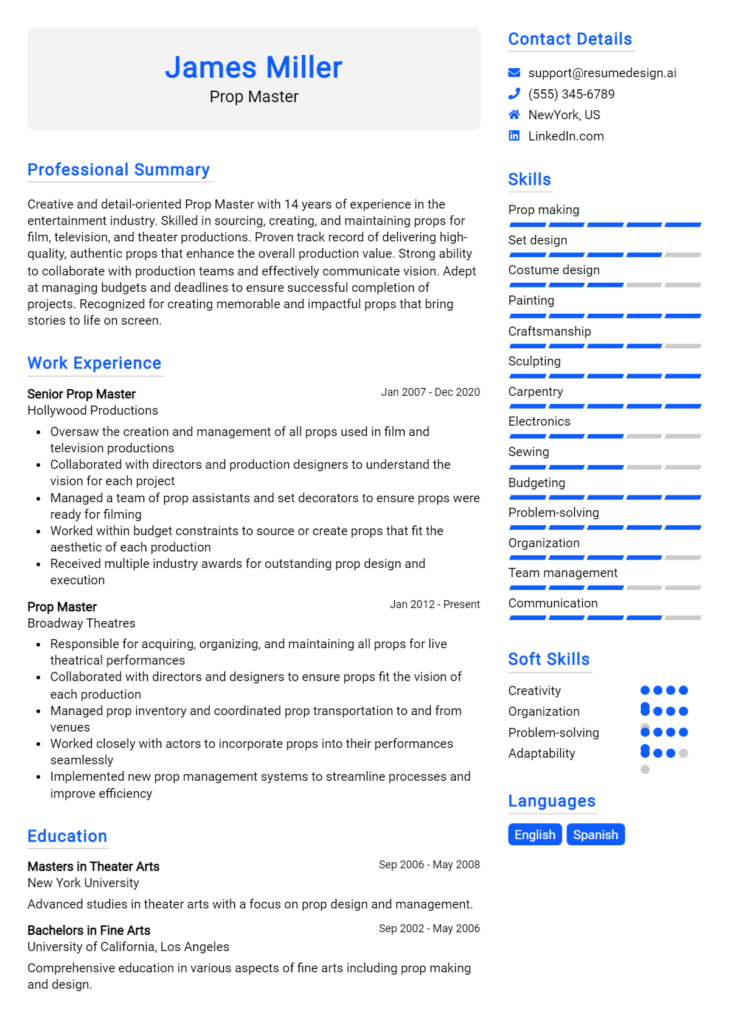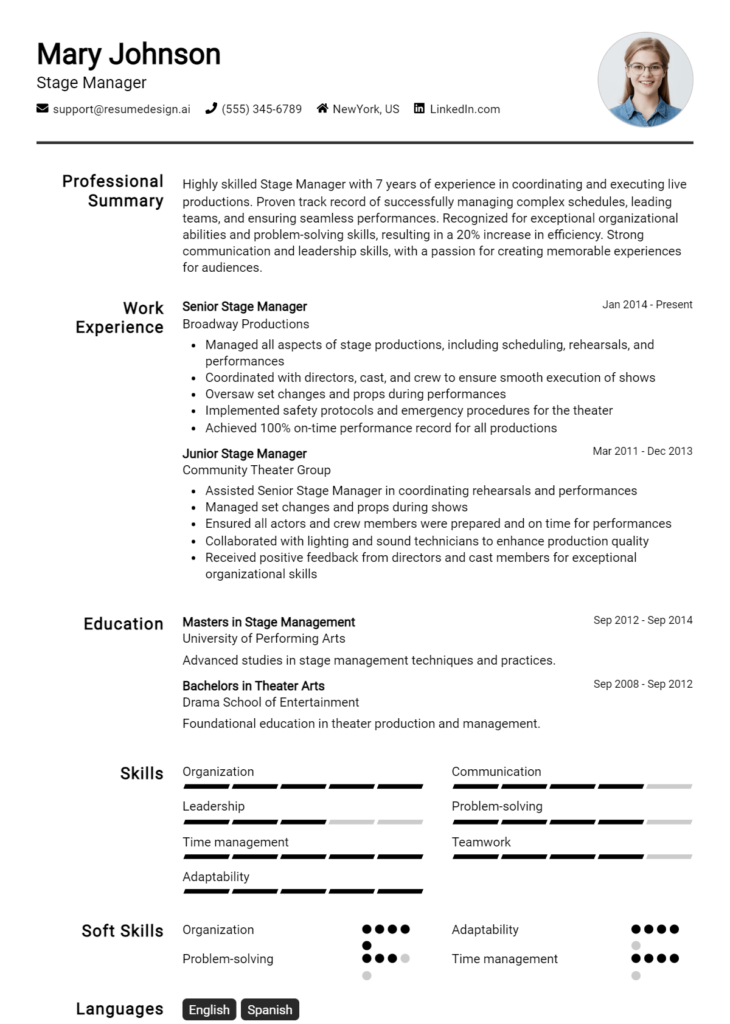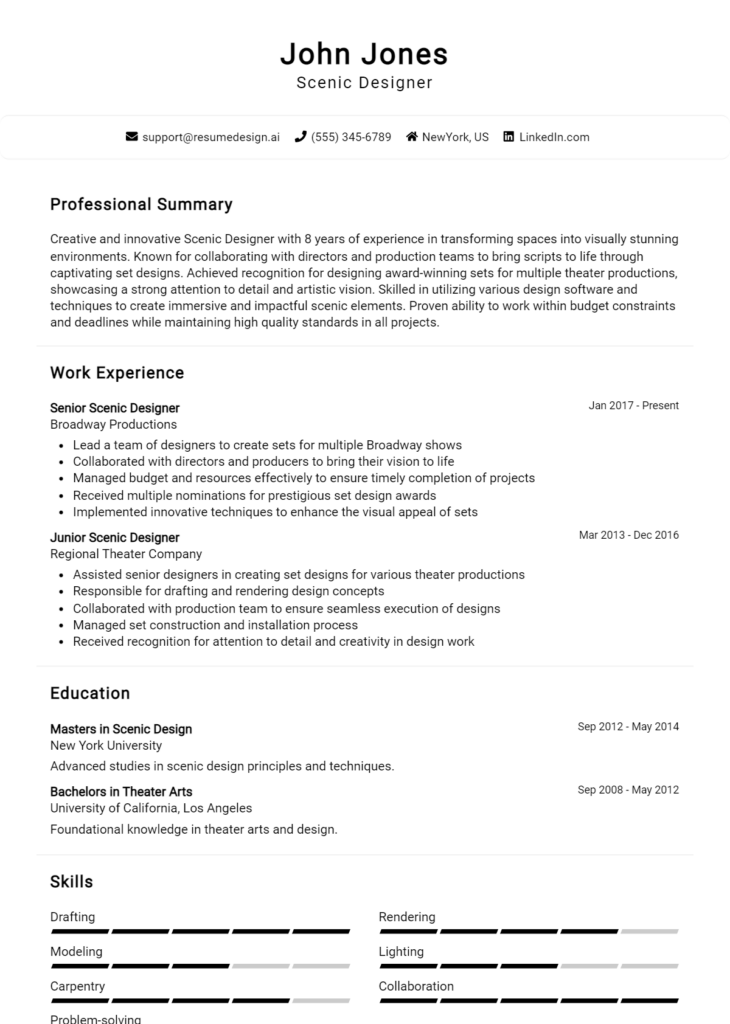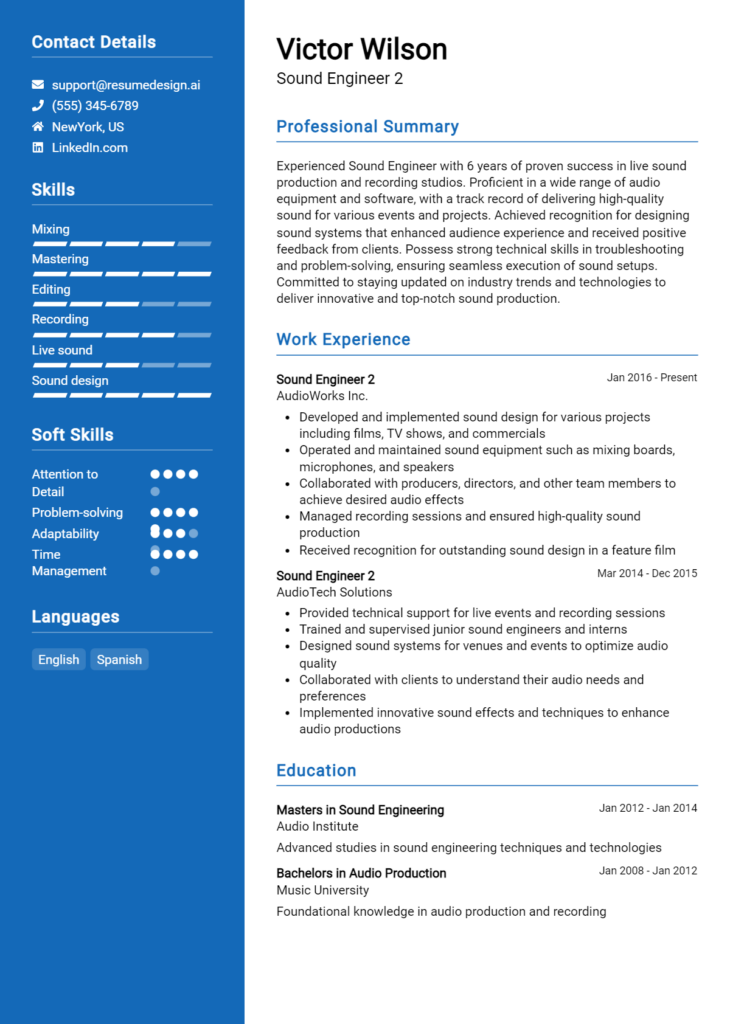Immersive Technology Specialist Core Responsibilities
An Immersive Technology Specialist plays a crucial role in bridging various departments such as IT, design, and marketing, facilitating the effective integration of virtual and augmented reality solutions. Key responsibilities include developing immersive experiences, conducting technical assessments, and collaborating with cross-functional teams to enhance user engagement. Successful specialists must possess strong technical skills, operational expertise, and problem-solving capabilities to align immersive technologies with organizational goals. A well-structured resume effectively highlights these competencies, showcasing the value they bring to the organization.
Common Responsibilities Listed on Immersive Technology Specialist Resume
- Design and develop immersive virtual and augmented reality experiences.
- Collaborate with cross-departmental teams to integrate immersive technologies.
- Conduct research on emerging trends in immersive technology.
- Evaluate and recommend hardware and software solutions.
- Optimize existing immersive experiences for improved performance.
- Provide technical support and training to end-users.
- Analyze user feedback to enhance product offerings.
- Manage project timelines and deliverables effectively.
- Document technical specifications and user guides.
- Ensure compliance with industry standards and best practices.
- Assist in the development of marketing strategies for immersive solutions.
- Support troubleshooting and problem resolution related to immersive technologies.
High-Level Resume Tips for Immersive Technology Specialist Professionals
In the rapidly evolving field of immersive technology, a well-crafted resume is not just a formality; it is a critical tool that can determine your chances of landing a job. For Immersive Technology Specialist professionals, your resume often serves as the first impression you make on potential employers, showcasing not only your technical skills but also your innovative achievements. It's essential that this document reflects both your expertise and the unique contributions you've made in previous roles. This guide will provide practical and actionable resume tips specifically tailored for Immersive Technology Specialist professionals, helping you stand out in a competitive job market.
Top Resume Tips for Immersive Technology Specialist Professionals
- Tailor your resume for each job application by using keywords from the job description to demonstrate your alignment with the specific role.
- Highlight relevant experience in immersive technologies, such as virtual reality (VR), augmented reality (AR), and mixed reality (MR), to showcase your expertise.
- Quantify your achievements by including metrics and outcomes to illustrate the impact of your work, such as user engagement rates or project completion times.
- Incorporate specific industry-related skills, such as 3D modeling, user experience design, or programming languages relevant to immersive technologies.
- Showcase your soft skills, like collaboration and communication, which are vital in multidisciplinary teams often found in immersive technology projects.
- Include relevant certifications or training programs that demonstrate your commitment to staying current in the field.
- Utilize a clean and professional format that enhances readability and allows your most important information to stand out.
- Provide links to your portfolio or projects that illustrate your experience and capabilities in immersive technology.
- Keep the resume concise, ideally one page, while ensuring it covers all necessary aspects of your professional background.
- Proofread your resume carefully to eliminate any errors, as attention to detail is crucial in technology-driven roles.
By implementing these tips, you can significantly enhance your resume, making it a compelling representation of your qualifications and experiences. A polished and targeted resume can greatly increase your chances of catching the eye of hiring managers in the Immersive Technology Specialist field, ultimately leading to new and exciting career opportunities.
Why Resume Headlines & Titles are Important for Immersive Technology Specialist
In the competitive field of immersive technology, the role of an Immersive Technology Specialist requires a unique blend of technical expertise and creative vision. A well-crafted resume headline or title serves as the first impression in this context, quickly capturing the attention of hiring managers and summarizing a candidate's key qualifications in a single impactful phrase. A strong headline should be concise, relevant, and directly related to the position being applied for, showcasing the candidate's value and making a compelling case for why they should be considered for the role.
Best Practices for Crafting Resume Headlines for Immersive Technology Specialist
- Keep it concise: Aim for one impactful phrase that encapsulates your expertise.
- Make it role-specific: Tailor your headline to reflect the specific position you’re applying for.
- Highlight key skills: Include essential technical skills or certifications relevant to immersive technology.
- Showcase achievements: Mention notable accomplishments that demonstrate your impact in previous roles.
- Use action-oriented language: Start with strong verbs that convey your proactive approach.
- Be clear and specific: Avoid jargon or vague terms; clarity is key to making a strong impression.
- Incorporate keywords: Use industry-specific terminology that aligns with the job description.
- Reflect your personal brand: Ensure your headline aligns with your overall professional identity.
Example Resume Headlines for Immersive Technology Specialist
Strong Resume Headlines
Creative Immersive Technology Specialist with 5+ Years in AR/VR Development
Award-Winning Immersive Designer Specializing in User-Centric Experiences
Innovative Immersive Tech Expert Focused on Enhancing Virtual Engagement
Results-Driven Specialist in Mixed Reality Solutions with Proven ROI
Weak Resume Headlines
Technology Specialist
Looking for Opportunities in Immersive Tech
The strong headlines listed above are effective because they are specific, action-oriented, and directly reflect the qualifications and experiences that hiring managers are seeking. They not only communicate what the candidate brings to the table but also align closely with the expectations of the role. In contrast, the weak headlines fail to impress due to their vagueness and lack of relevance, leaving hiring managers without a clear understanding of the candidate's strengths or suitability for the role.
Writing an Exceptional Immersive Technology Specialist Resume Summary
A well-crafted resume summary is crucial for an Immersive Technology Specialist, as it serves as the first impression for hiring managers. This concise paragraph provides an opportunity to showcase your key skills, relevant experience, and notable accomplishments, effectively capturing the attention of potential employers. A strong summary highlights your expertise in immersive technologies such as virtual reality, augmented reality, and mixed reality, demonstrating how your background aligns with the specific job role. By tailoring this summary to match the requirements of the position you are applying for, you can make a lasting impact, ensuring that your resume stands out among the competition.
Best Practices for Writing a Immersive Technology Specialist Resume Summary
- Quantify Achievements: Use specific numbers to highlight your successes, such as percentage increases in user engagement or project completion rates.
- Focus on Skills: Emphasize key technical skills relevant to immersive technologies, such as programming languages, software tools, and hardware knowledge.
- Tailor for the Job: Customize your summary to reflect the specific requirements and keywords in the job description.
- Highlight Relevant Experience: Showcase your most pertinent work experience that aligns with the responsibilities of the role.
- Showcase Problem-Solving Abilities: Mention instances where your expertise led to successful project outcomes or innovative solutions.
- Keep it Concise: Aim for 3-5 sentences that deliver impactful information without being overly verbose.
- Use Action Verbs: Start sentences with strong action verbs to convey a sense of proactivity and accomplishment.
- Reflect Passion for the Field: Communicate your enthusiasm for immersive technology and your commitment to staying current with industry trends.
Example Immersive Technology Specialist Resume Summaries
Strong Resume Summaries
Results-driven Immersive Technology Specialist with over 5 years of experience in developing engaging AR and VR applications, resulting in a 30% increase in user retention rates. Proficient in Unity and Unreal Engine, with a proven ability to lead cross-functional teams to deliver high-quality projects on time and within budget.
Innovative Immersive Technology Specialist with a strong background in 3D modeling and user experience design, successfully launching 10+ interactive installations for major clients, enhancing visitor engagement by 40%. Adept at leveraging cutting-edge technologies to create immersive experiences that align with client goals.
Dedicated Immersive Technology Specialist with a passion for virtual reality and a track record of achieving a 25% reduction in development time through efficient project management and agile methodologies. Skilled in collaborating with stakeholders to conceptualize and execute groundbreaking immersive solutions.
Weak Resume Summaries
Experienced technology specialist with knowledge in immersive technologies and a general understanding of programming.
I have worked on various projects and have some experience with VR and AR. I am looking for a job in the immersive tech field.
The strong resume summaries are effective because they provide specific examples of achievements and relevant skills, quantifying success in a way that appeals to hiring managers. They also tailor the content to demonstrate direct relevance to the role of an Immersive Technology Specialist. In contrast, the weak resume summaries lack detail, specificity, and quantifiable outcomes, making them generic and less compelling for potential employers.
Work Experience Section for Immersive Technology Specialist Resume
The work experience section of an Immersive Technology Specialist resume is vital for demonstrating a candidate's practical knowledge and competencies in the field. This section not only highlights the technical skills acquired over time but also showcases the ability to manage diverse teams and deliver high-quality immersive products. By quantifying achievements and aligning experiences with industry standards, candidates can effectively illustrate their value to potential employers, making this section a critical element of a strong resume.
Best Practices for Immersive Technology Specialist Work Experience
- Emphasize technical skills relevant to immersive technologies, such as VR/AR development, 3D modeling, and programming languages.
- Quantify achievements with specific metrics, like project timelines, budget management, and user engagement statistics.
- Highlight collaborative efforts with cross-functional teams, including designers, developers, and marketing professionals.
- Include descriptions of leadership roles taken in projects, showcasing both team management and project execution.
- Align experience with industry standards by using relevant terminology and frameworks commonly recognized in immersive technology.
- Provide context for each role, detailing the impact of your contributions on the overall project or organization.
- Tailor the work experience section to match the job description of the position being applied for.
- Use action verbs to convey a sense of initiative and responsibility in your roles.
Example Work Experiences for Immersive Technology Specialist
Strong Experiences
- Led a cross-functional team of 10 in developing a VR training simulation that improved employee onboarding efficiency by 40%, resulting in a $100K reduction in training costs.
- Developed an AR application for retail that increased customer engagement by 30%, leading to a 15% rise in sales over the first quarter post-launch.
- Managed a budget of $500K for a multi-platform immersive experience, ensuring timely delivery and adherence to quality standards while achieving a 20% savings through strategic vendor negotiations.
- Collaborated with UX designers and developers to create an award-winning immersive game, receiving recognition at the National Game Developers Conference for innovation in user experience.
Weak Experiences
- Worked on various immersive projects without specifying technologies or outcomes.
- Assisted in the development of AR applications, but did not detail specific contributions or results.
- Participated in team meetings and discussions regarding immersive technology.
- Involvement in projects that were related to VR, but lacking any quantifiable achievements or responsibilities.
The examples presented illustrate the difference between strong and weak experiences in a resume. Strong experiences are defined by their specificity, quantifiable results, and clear demonstrations of leadership and collaboration, making them compelling to potential employers. In contrast, weak experiences lack detail, fail to articulate the candidate's contributions or outcomes, and do not effectively showcase the skills or achievements that would be beneficial in an immersive technology role.
Education and Certifications Section for Immersive Technology Specialist Resume
The education and certifications section of an Immersive Technology Specialist resume is critical in establishing a candidate's qualifications and expertise in a rapidly evolving field. This section not only showcases the candidate's academic background but also emphasizes their commitment to continuous learning and professional development. By providing details about relevant coursework, industry-recognized certifications, and specialized training, candidates can significantly enhance their credibility and demonstrate their alignment with the technical requirements and innovative nature of the role.
Best Practices for Immersive Technology Specialist Education and Certifications
- Prioritize relevant degrees, such as those in computer science, graphic design, or virtual reality.
- Include industry-recognized certifications, like those from Unity, Unreal Engine, or AR/VR specialization programs.
- Detail specific relevant coursework that demonstrates knowledge in immersive technologies, 3D modeling, or user experience design.
- Highlight any specialized training or workshops attended related to immersive technologies.
- Keep the section organized and concise to enhance readability and impact.
- Use bullet points for clarity and ensure all entries are up-to-date.
- Consider including ongoing education efforts, such as online courses or webinars, to showcase a commitment to staying current in the field.
- Tailor the content to match the specific job description and requirements to reinforce alignment with the employer's needs.
Example Education and Certifications for Immersive Technology Specialist
Strong Examples
- Bachelor of Science in Computer Science, XYZ University, 2020
- Certified Unity Developer, Unity Technologies, 2021
- Completed coursework in Virtual Reality Design and Development, ABC College, 2019
- Advanced Diploma in 3D Animation and Visual Effects, DEF Institute, 2022
Weak Examples
- Bachelor of Arts in English Literature, GHI University, 2018
- Certification in Basic Microsoft Office Applications, JKL Training Center, 2020
- Completed a course on Traditional Graphic Design, MNO Academy, 2017
- High School Diploma, PQR High School, 2016
The strong examples are considered effective because they directly relate to the skills and knowledge required for an Immersive Technology Specialist, showcasing relevant degrees and certifications that demonstrate both expertise and commitment to the field. In contrast, the weak examples reflect qualifications that lack direct relevance to immersive technology, indicating a misalignment with the role's requirements and failing to support the candidate's case for employment in a specialized area.
Top Skills & Keywords for Immersive Technology Specialist Resume
As an Immersive Technology Specialist, possessing the right skills is crucial for crafting a compelling resume that reflects your expertise and value in this rapidly evolving field. Employers are increasingly looking for candidates who can seamlessly blend creativity with technical knowledge, making it essential to highlight both hard and soft skills. A well-structured resume that showcases these skills can significantly enhance your chances of landing an interview, demonstrating not only your proficiency in immersive technologies but also your ability to collaborate and innovate in a team environment. To help you build an effective resume, here is a breakdown of the top skills that should be included.
Top Hard & Soft Skills for Immersive Technology Specialist
Soft Skills
- Creative Problem Solving
- Effective Communication
- Team Collaboration
- Adaptability
- Critical Thinking
- Time Management
- Attention to Detail
- User Empathy
- Project Management
- Interpersonal Skills
Hard Skills
- Virtual Reality (VR) Development
- Augmented Reality (AR) Programming
- 3D Modeling and Animation
- Game Engine Proficiency (e.g., Unity, Unreal Engine)
- Computer Vision Techniques
- User Experience (UX) Design
- Software Development (e.g., C#, JavaScript)
- Motion Capture Technology
- Immersive Audio Design
- Hardware Integration
By integrating a comprehensive list of skills and showcasing relevant work experience, you can create a powerful resume that stands out to potential employers in the immersive technology sector.
Stand Out with a Winning Immersive Technology Specialist Cover Letter
I am writing to express my interest in the Immersive Technology Specialist position at [Company Name]. With a strong background in virtual and augmented reality, coupled with extensive experience in immersive content creation and user experience design, I am excited about the opportunity to contribute to your innovative team. My passion for transformative technology and its potential to enhance learning and engagement aligns perfectly with your company’s mission to push the boundaries of digital experiences.
In my previous role at [Previous Company Name], I successfully led a team in developing interactive training simulations that leveraged virtual reality to improve employee performance and retention. By collaborating closely with subject matter experts, I was able to design immersive experiences that not only engaged users but also delivered measurable improvements in knowledge retention. My expertise in software tools, such as Unity and Unreal Engine, combined with my skills in 3D modeling and storytelling, empowers me to create compelling immersive experiences that resonate with diverse audiences.
I am particularly drawn to [Company Name] because of your commitment to exploring new horizons in immersive technology. Your recent project on [specific project or initiative] exemplifies the innovative spirit I admire, and I am eager to contribute my skills to further enhance your offerings. I thrive in collaborative environments and believe that my ability to bridge the gap between technical development and creative vision will be an asset to your team.
Thank you for considering my application. I am looking forward to the opportunity to discuss how my background in immersive technology can contribute to the continued success of [Company Name]. I am excited about the possibility of bringing my unique blend of skills and experience to your organization and helping to create groundbreaking immersive experiences that captivate and educate users.
Common Mistakes to Avoid in a Immersive Technology Specialist Resume
Crafting a resume as an Immersive Technology Specialist requires a keen understanding of both the technical skills and creative insights necessary for the role. However, many candidates fall into common traps that can undermine their qualifications. Avoiding these pitfalls can significantly enhance the effectiveness of your resume, ensuring that your skills and experiences are presented in the best possible light. Here are some mistakes to steer clear of:
Vague Job Descriptions: Failing to provide specific examples of past projects can leave hiring managers unsure of your experience. Clearly articulate your role and contributions to immersive technology projects.
Ignoring Relevant Keywords: Many employers use applicant tracking systems (ATS) that screen resumes for specific keywords. Not including terms like "virtual reality," "augmented reality," or "3D modeling" may lead to your resume being overlooked.
Overloading with Jargon: While it's important to demonstrate technical expertise, using excessive industry jargon can alienate readers. Strive for a balance by explaining complex concepts in a clear and concise manner.
Lack of Quantifiable Achievements: Simply listing responsibilities does not showcase your impact. Incorporate metrics or outcomes, such as "increased user engagement by 30% through a VR training program."
Neglecting Soft Skills: Technical skills are crucial, but soft skills like teamwork, communication, and problem-solving are equally important. Highlight these attributes to show you are a well-rounded candidate.
Inconsistent Formatting: A disorganized resume can distract from your qualifications. Maintain consistent formatting, including font styles, bullet points, and headings for a polished appearance.
Failing to Tailor the Resume: Sending out a generic resume can be detrimental. Customize your resume for each job application to align your experiences with the specific requirements of the position.
Omitting Continuing Education: The field of immersive technology is rapidly evolving. Not mentioning recent courses, certifications, or workshops can give the impression that you are not keeping up with industry trends.
Conclusion
As an Immersive Technology Specialist, your expertise in virtual reality, augmented reality, and mixed reality applications is vital in various industries, from gaming to healthcare. In this article, we've explored the essential skills and qualifications needed for this role, including proficiency in software development, 3D modeling, and user experience design. We also highlighted the importance of staying updated with the latest technological advancements and industry trends, as well as the value of hands-on experience through projects and collaborations.
To ensure that you stand out in this competitive field, it's crucial to have a well-crafted resume that effectively showcases your skills and experiences. Take the time to review your Immersive Technology Specialist resume to ensure it aligns with industry standards and highlights your unique qualifications.
To assist you in this process, consider utilizing the range of resources available to enhance your resume. Explore our resume templates to find a design that resonates with your professional style. Use our resume builder for a streamlined experience in creating a compelling resume. Additionally, check out our resume examples for inspiration on how to effectively present your achievements. Don’t forget to craft a strong introduction with our cover letter templates that complement your resume and highlight your enthusiasm for the role.
Take action today to elevate your job application materials and make a lasting impression in the immersive technology landscape!

